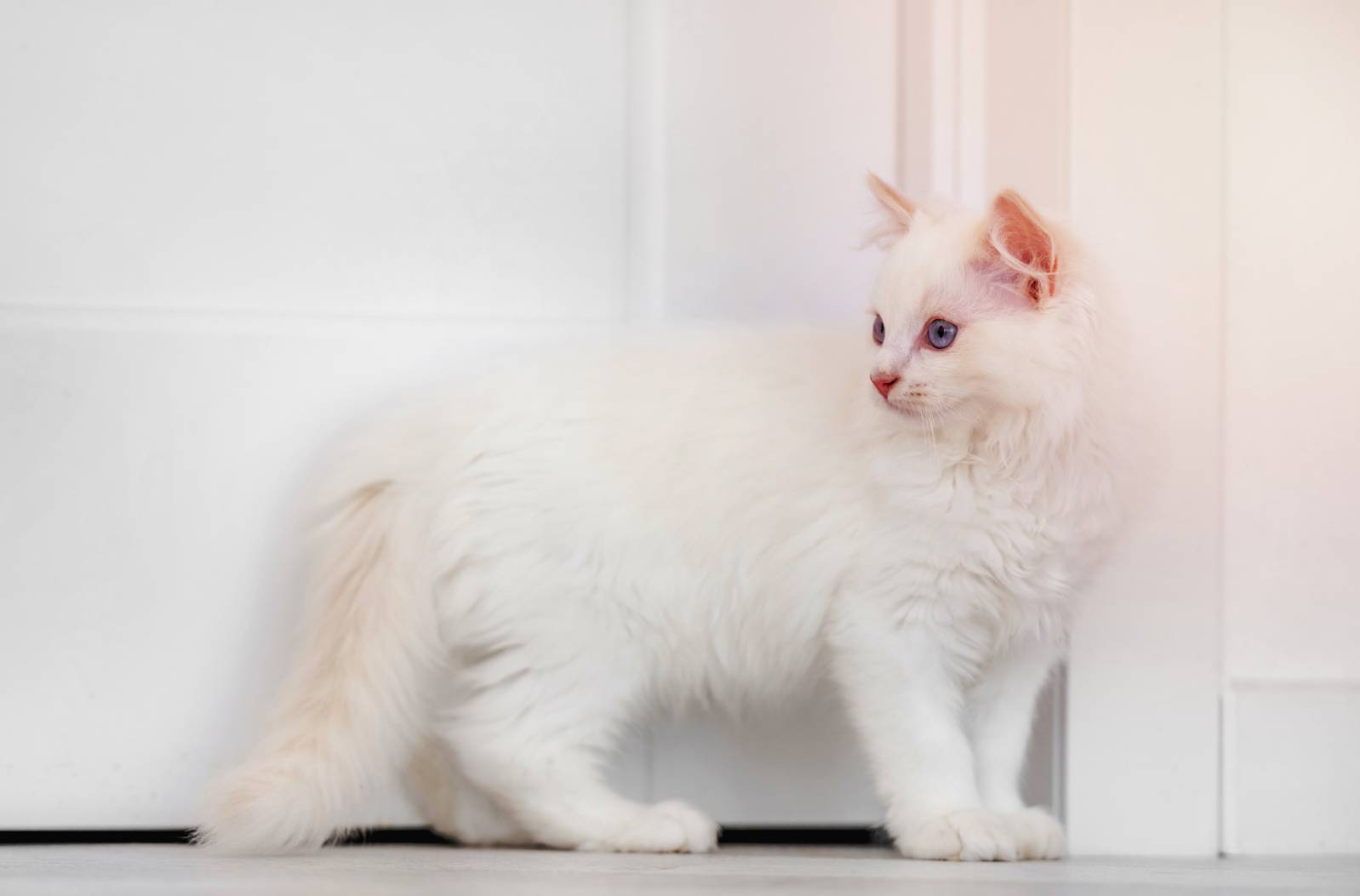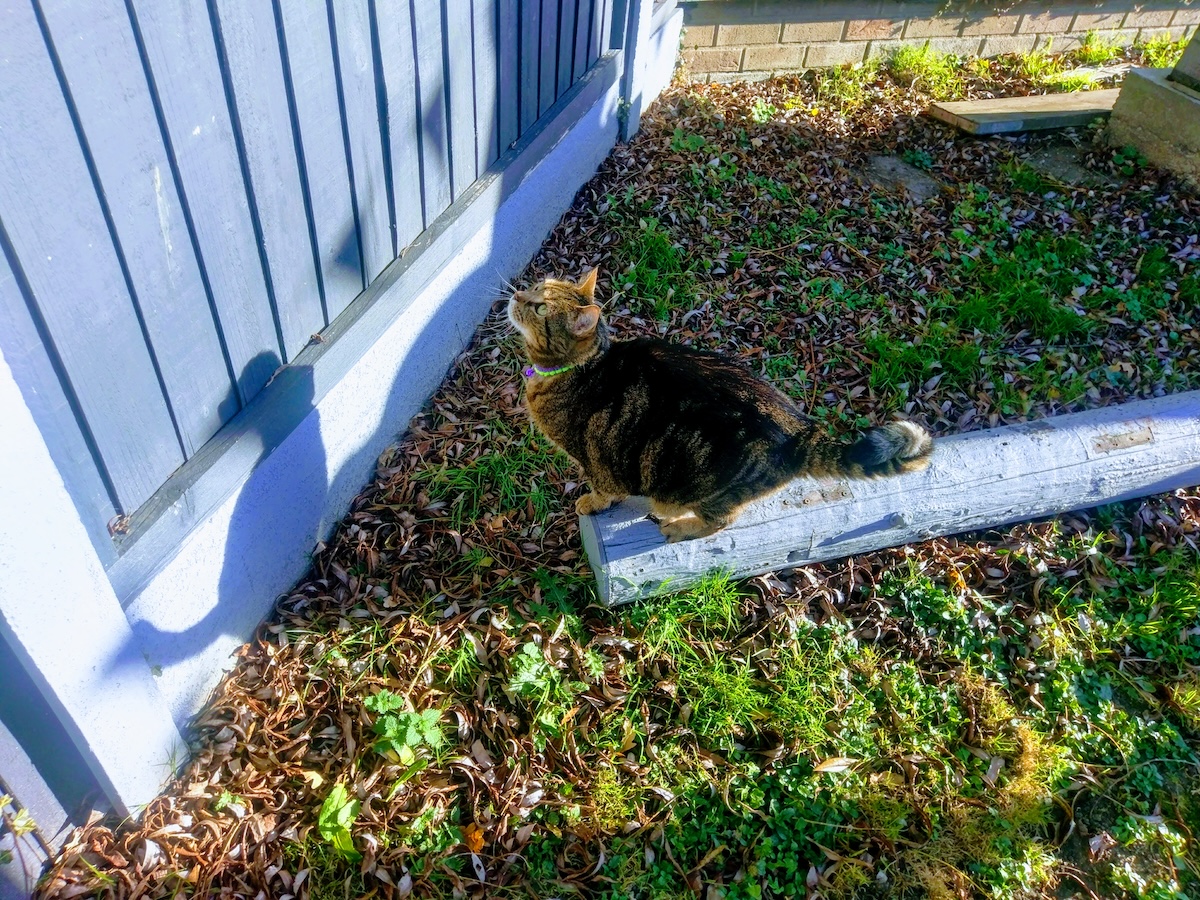
Collars help keep your cat safe, but the wrong collar can also be a danger. Cats have been hurt and even killed by their collars before, which is a terrible tragedy for any pet owner.
To make sure your cat is always safe and easily identifiable, we’ve tried out loads of different cat collars, looking for the ones that we could trust with our cats’ lives. The following reviews will compare our favorites so you can pick the best cat collar that’s perfect fit for your cat.
A Quick Comparison of Our Winners of 2024
| Image | Product | Details | ||
|---|---|---|---|---|
| Best Overall |

|
Hepper Hemp Breakaway Cat Collar |
|
CHECK PRICE |
| Budget Buy |

|
Frisco Solid Nylon Breakaway Cat Collar |
|
CHECK PRICE |

|
Pettsie Heart Cat Collar |
|
CHECK PRICE | |

|
Necoichi Japanese Kimono Style Bow Tie Cat Collar |
|
CHECK PRICE | |

|
Pawtitas Glow In The Dark Cat Collar |
|
CHECK PRICE |
The 11 Best Cat Collars
1. Hepper Hemp Breakaway Cat Collar – Best Overall
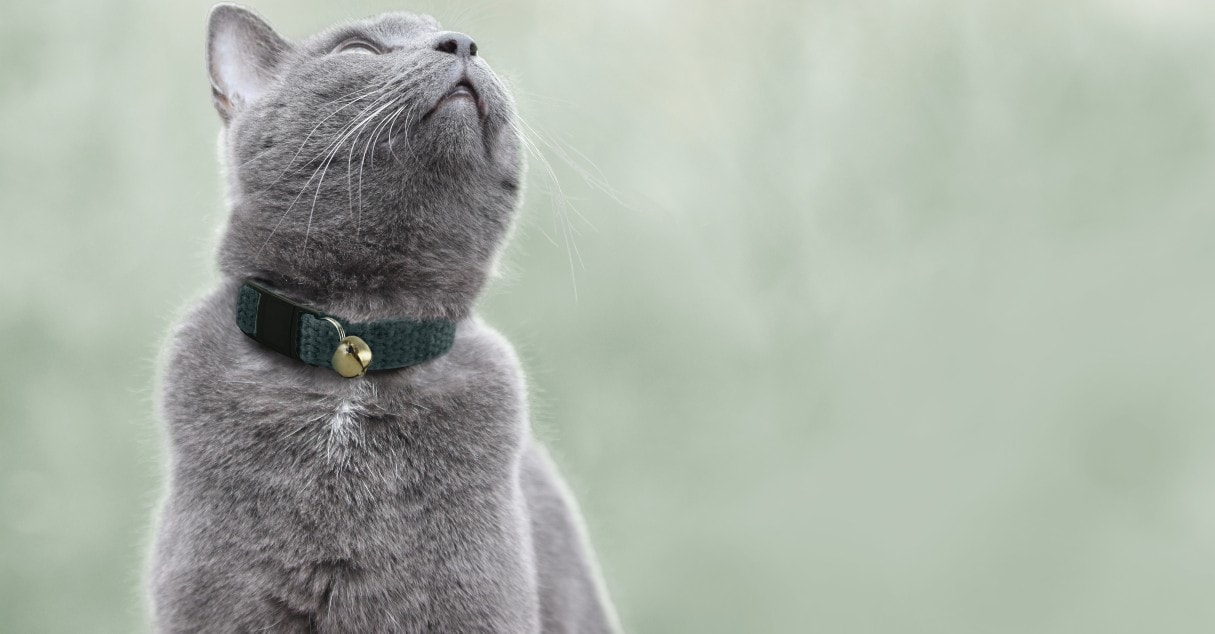
The Hepper Hemp Breakaway Collar gets our vote for the #1 best overall cat collar thanks to its winning combination of safety, style, and comfort. For safety purposes, your cat should always wear a collar featuring their name and contact information; it’s a simple and practical way to increase the likelihood of your pet being quickly returned home if lost.
Breakaway collars keep kitties safe when exploring the great outdoors, and they’re designed to break open and allow cats to escape when caught. The Hepper Breakaway Collar is not only functional; it’s also attractive! It comes in several pastel colors to give kitties a fashionable flair. It also has a bell to warn birds and other critters of your cat’s presence.
The collar’s hemp webbing features natural protection against UV rays and mold, and the adjustable collar expands to 11 inches, making it an excellent choice for larger pets. To clean the collar, wash it by hand and allow it to air dry.
At Catster, we’ve admired Hepper for many years, and decided to take a controlling ownership interest, so that we could benefit from the outstanding designs of this cool cat company!
- Adjustable fit
- Breakaway design
- Available in multiple colors
- UV ray and mold resistant
- Not appropriate for walking
2. Frisco Solid Nylon Breakaway Cat Collar – Budget Buy

If you’re looking for a well-crafted collar at an affordable price, we think the Frisco Solid Nylon Breakaway Cat Collar is an excellet budget option. It’s adjustable from 8-12 inches so it will fit most adult cats, and it’s loaded with precisely the features that cat owners are looking for.
To make sure your cat is comfortable, this collar uses soft-edged plastic hardware that’s much gentler against your cat than metal, except for the metal ring that’s perfect for holding an ID tag. There’s even a little removable wildlife bell attached so you and other little critters know where your cat is.
This is a breakaway collar, so if it happens to get caught, the latch will release, and the collar will come off, so your cat doesn’t choke. Our only complaint is the plastic breakaway connector, which isn’t as durable as we’d like. If your cat starts gets it off and starts to chew it, you’ll likely need a new collar.
- Adjustable from 8-12 inches
- Has a metal ring for an ID tag
- Breakaway collar won’t choke your cat
- Soft-edged plastic hardware is gentle against your cat
- Removable wildlife bell
- Cats can easily destroy the plastic breakaway connector
3. Pettsie Heart Cat Collar
You love your cat more than almost anything or anyone else, and with the Pettsie Heart Cat Collar, you can easily show the world how much you care. This set is more than just a comfortable cotton cat collar with an ornate design, though it is that. Included with the collar is a matching friendship bracelet for you, so you and your beloved feline can always be connected.
This comfortable cat collar has a cute wooden heart on it, made from beech wood. It also features a breakaway buckle to ensure your cat is always safe. You can adjust the collar from 8-11 inches, so all but the biggest cats should find a good fit.
Unfortunately, this set is pretty expensive. It’s several times the cost of other cat collars, but it’s also unique with the inclusion of a matching friendship bracelet so you and your cat can match.
If you’re looking for a premium pick, though, this is the best cat collar we think you will find.
- Includes a friendship bracelet to match your cat’s collar
- Features attractive patterning and a wooden heart
- Breakaway buckle keeps our cat safe
- Adjusts from 8-11 inches
- Several times more expensive than other collars
4. Necoichi Japanese Kimono Style Bow Tie Cat Collar

This collar is shaped like a bowtie, helping your feline to look more dignified than ever. It’s made from real kimono-grade chirimen rayon material with Japanese style art and luxurious looking colors. Unfortunately, the fabric wasn’t as soft as we expected and actually felt coarse.
Like all of our favorite collars, this one has a breakaway buckle for your cat’s safety. It’s too weak though, so some of our cats were able to take it off on their own. At least you can be sure it won’t choke any of your cats!
This collar is widely adjustable from 8-14 inches, so it should fit most adult cats. It’s an ornate collar with a unique look, but you’re mostly paying for appearances. If the material were softer and the buckle a bit stronger, this might have been one of our favorites.
- Very unique and ornate look
- Breakaway buckle for your cat’s safety
- Made from chirimen rayon material
- Can be adjusted from 8-14 inches
- More expensive than other options
- The breakaway buckle is too weak
- The fabric is coarse rather than soft and comfortable
5. Pawtitas Glow In The Dark Cat Collar
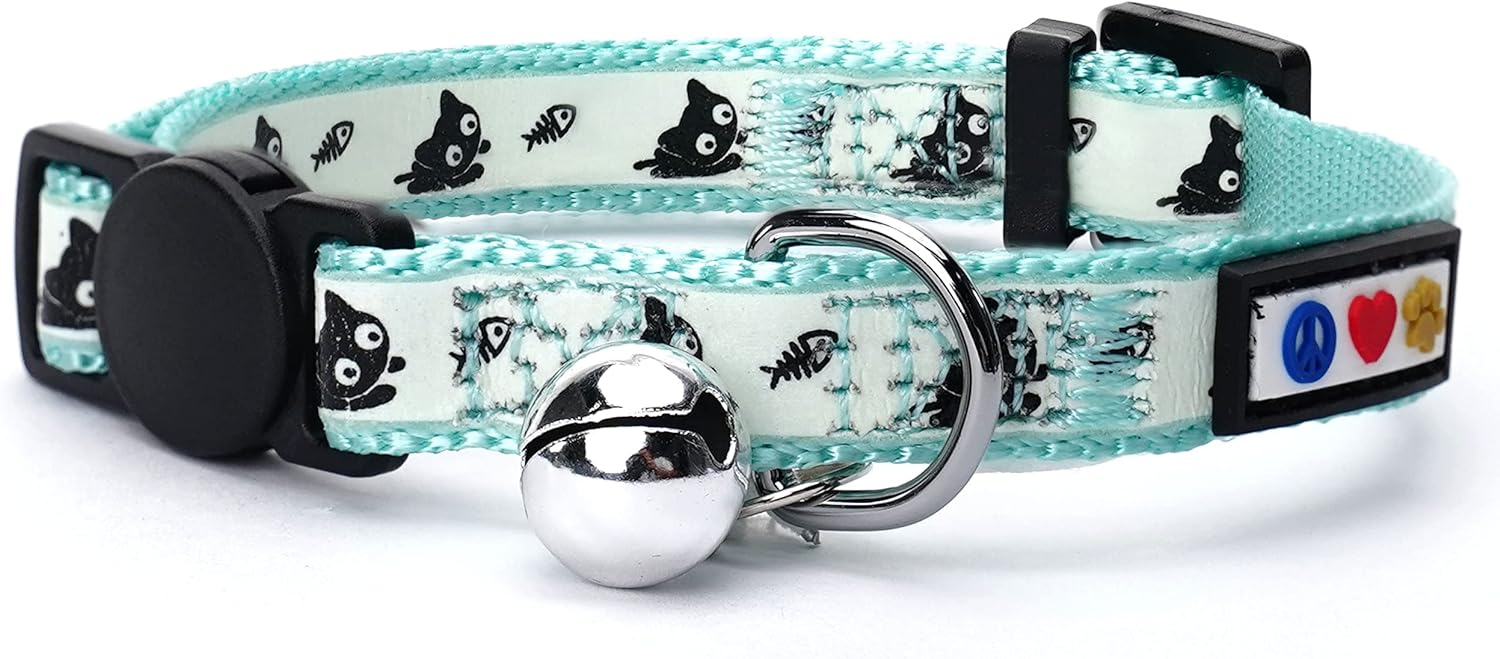
If you ever have trouble locating your cat in the dark, then you might consider a glow in the dark collar, like this one from Pawtitas. It’s a breakaway collar that will release your cat if they happen to get caught, and it’s made from highly reflective material that makes it easier to see your cat if there’s any light at all. But the glow in the dark effect was minimal at best, and only seemed to work for a short while after the lights were off.
Since it adjusts from 7-11 inches, this collar will fit most felines from 5-20 pounds. There are quite a few colors and designs to choose from, so you can find the one that best fits your cat’s personality. We did notice that the reflective material was much harder to see on longhaired cats since their hair tends to cover the collar.
As a final note, the reflective material began cracking after just a few weeks. The nylon portion of the collar was holding up fine, but the reflective ribbon and design aren’t going to last as long as the rest of the collar.
- Many colors and designs to choose from
- Good for cats from 5-20 pounds
- Highly reflective
- Difficult to see on long-haired cats
- The “glow” effect is minimal at best
- Reflective material is prone to cracking
6. Red Dingo Classic Cat Collar

Stylish and safe, the Red Dingo Classic Cat Collar has everything we’re looking for. It features a large quick-release safety clip shaped like a fish that opens when there’s tension, so it won’t ever strangle your cat if it gets caught while they’re out climbing and exploring.
This collar is machine washable, so it’s easy to clean and keep fresh. There’s even a little wildlife bell attached that will alert nearby prey to your cat’s approach, so you won’t wake up to dead mice on your floor
Since it’s adjustable from eight to 12.5 inches, this collar is practically a universal fit, great for cats from 3 pounds to 25. You can choose from several attractive colors to provide the look you prefer. But be aware that these collars fray pretty easily if your cat scratches at it.
- Quick-release clip breaks away with pressure
- Built-in wildlife bell to alert nearby prey
- Machine washable
- Great for cats that weigh 3-25 pounds
- Many colors to choose from
- They tend to fray with scratching
7. CollarDirect Leather Cat Collar

For those who prefer the simple aesthetics of solid colors over the designs on many cat collars today, the CollarDirect Leather Cat Collar offers a basic and classic look that’s available in a wide selection of colors. They’re made of genuine full-grain leather with heavy-duty metal hardware, giving them a feel of quality and durability.
This collar doesn’t have a breakaway latch, but instead, features an elastic section that will stretch if it gets caught, providing your cat with the room it needs to get out and ensuring that your cat won’t choke.
We like the overall quality of this collar, but it’s priced too high compared to the competition. The quality is solid, but the color can be chewed off to reveal the black leather underneath. It also doesn’t have the universal fit of other collars we liked since it has just two inches of adjustability. To be fair, there are two sizes to choose from, but other collars we’ve used had more than twice the adjustability of this one, simplifying the sizing process.
- Elastic strap allows your cat to break free
- Wide selection of colors
- Simple yet pleasing aesthetics
- Only two inches of adjustability
- Our cats chewed the color off
- More expensive than other options
8. Coastal Pet Products ElastaCat Pet Collar

Thanks to its wide adjustability, the Coastal Pet Products ElastaCat Pet Collar will fit any cat’s neck up to 10 inches. This means that larger cats are out of luck, but smaller cats of any size will find a good fit here. It’s also one of the cheapest-priced collars on this list, which will automatically attract some to it.
Thinking towards the safety of your feline, this collar is elasticized so it will expand, and your cat can get free if it gets caught. But it’s so elastic that it’s very easy for cats to remove and it never seemed to stay on any cat’s neck for very long. The fabric also isn’t very durable, and it became shredded and frayed pretty quickly. There’s also a safety charm attached to this collar, but it’s a laughable little plastic charm that isn’t of much use.
- Dirt-cheap pricing
- Fits any neck up to 10 inches
- Too easy for cats to remove
- The fabric shreds and frays easily
- Won’t fit larger felines
- Included “safety charm” is laughable
9. Kittyrama Cat Collar

The Kittyrama Cat Collar has a unique design, opting for hypoallergenic silicon straps instead of the more common nylon or leather. In theory, this is a great idea. Silicone is soft, waterproof, lightweight, and easy against your cat’s skin. The problem is, it’s not strong enough. Our collar lasted only a few months before the straps were falling apart.
Though this is one of the coolest cat collars out there, this collar doesn’t offer much in the way of durability, it’s more than twice the price of other collars we’ve used that lasted longer. But the Kittyrama collar definitely offers a unique look, if that’s more important to you. It comes in three interesting color combinations that can give your cat a special look.
For the safety of your pet, this collar features a breakaway latch that opens with just 5.5 pounds of force; enough so your cat isn’t pulling it off but light enough to release in an emergency. But you get less than three inches of adjustability, so be certain it fits your cat before ordering this collar.
- Hypoallergenic silicone straps
- Breakaway latch opens with 5.5 pounds of force
- Less than three inches of adjustability
- Twice the price of other collars
- Weak materials only last a few months
10. PUPTECK Soft Leather Cat Collar

This collar from PUPTECK comes in a pack of two, ideal for those who don’t have just one cat to collar. They’re made from durable, long-lasting PU leather, so you can be sure they’ll hold up for the long-haul.
There are two major problems with this collar, and they’re the reasons for it ranking so low on our list. First, there is no breakaway hasp on this collar and no elastic either. If your cat gets it caught, they’re likely a goner.
The second issue we have with this collar is its lack of adjustability. It only adjusts from 8.7-10.6 inches, which is less than two inches. This means it won’t fit most small cats or very large cats. And the strap that holds the excess isn’t movable, so if you have to tighten this collar a lot, your cat will have several inches of excess collar protruding from their neck!
- Two collars for an affordable price
- Made from durable, long-lasting PU leather
- No breakaway hasp or elastic for escape
- Doesn’t get tight enough for many cats
- The extra length protrudes from your cat’s neck
11. Petmate Cat Pet Collar

Featuring attractive color combinations with cute designs, the Petmate Cat Pet Collar is an attractive, yet basic collar that missed the mark, even on its utterly simple design.This collar has no extras, it’s just a barebones breakaway collar with a cute ribbon sewn on and an annoyingly loud bell attached. We also had a very difficult time sizing this collar. The hardware doesn’t want to slide, so it’s a pain to resize. Luckily, you should only have to do it once. Still, we’d prefer not to do it at all since there were so many collars we liked better.
- Several colors and patterns to pick from
- No ring for hanging a tag
- The bell is exceptionally loud
- Difficult to adjust the sizing
You might also be interested in: Cat Shock Collars: Are They Safe? What You Need to Know!
Buyer’s Guide: How to Choose the Best Cat Collars
At first thought, choosing the best cat collar for your cat seems like a simple decision. Just find one that fits and that should do the trick, right?
Then, you notice all the different materials they’re made of, the many different sizes, breakaway buckles, elastic, and more features than you realized you needed to consider.
We’ve been through many collars on many cats, so we’ve made every mistake you can make when it comes to collaring your cat. To help you avoid the same mistakes, we’ve written this short buyer’s guide that should make it easy to narrow down the options to the things that matter most to you.
How to Fit Your Cat’s Collar
All features aside, the most important aspect of any collar is how it fits your cat. You can get a collar with all the safety features and extras you can name, but if it doesn’t fit your cat, it’s not going to be much good.
Luckily, most cat collars have some degree of adjustability, though it ranges from collar to collar. Some might have upwards of five inches of adjustability while others have a mere two inches.
Measuring for Your Cat’s Collar
The best way to ensure the collar you purchase is a perfect fit for your furry friend is to measure their neck so you can be certain what size collar they need.
Measuring your cat’s neck is very easy. All you need is a soft tape measure. Snugly but not tightly, wrap the tape measure around your cat’s neck where the collar will lay and make note of where the ends meet.
If you don’t have a soft-sided tape measure, you can use a string instead. Gently but snugly wrap the string around your cat’s neck and firmly grasp it with your fingertips at the point where the two sides meet. Remove the string and measure the distance from the start to your fingers.
Fitting Your Cat’s Collar
Now that you know the size of your cat’s neck, you can get a collar that will fit properly. You’ll want to add an inch or two to the measurement you took since you won’t want the collar to be too tight on their neck.
As a general rule of thumb, you should be able to fit two fingers under the collar when it’s on your cat if it’s properly sized. This way it’s snug enough to stay put and make it difficult for your cat to remove, but loose enough that it won’t rub on them or be uncomfortable.
Choosing the Correct Cat Collar
Determining the right size collar to purchase is the most important part of the collar-buying process, but it’s not the only decision. Now that you have the measurement of your cat’s neck, you need to decide what you want the collar to look like, what it should be made of, which safety features you prefer, and more.
Material
Cat collars are made out of many different materials, though the most common is nylon. Each material has a different feel and look, though all can make effective collars, so it’s really a matter of personal preference.
Some materials you can choose from include:
- Nylon
- Leather
- PU leather
- Silicone
- Cotton
- Fabric
Safety Features
Cats are inquisitive creatures that love to explore. This often leads to them squeezing into tight places where collars can easily get stuck. Luckily, safety features are implemented to make sure that your cat can escape and doesn’t get strangled in such a situation. Breakaway buckles and elastic collars both work to keep your cat safe but in different ways.
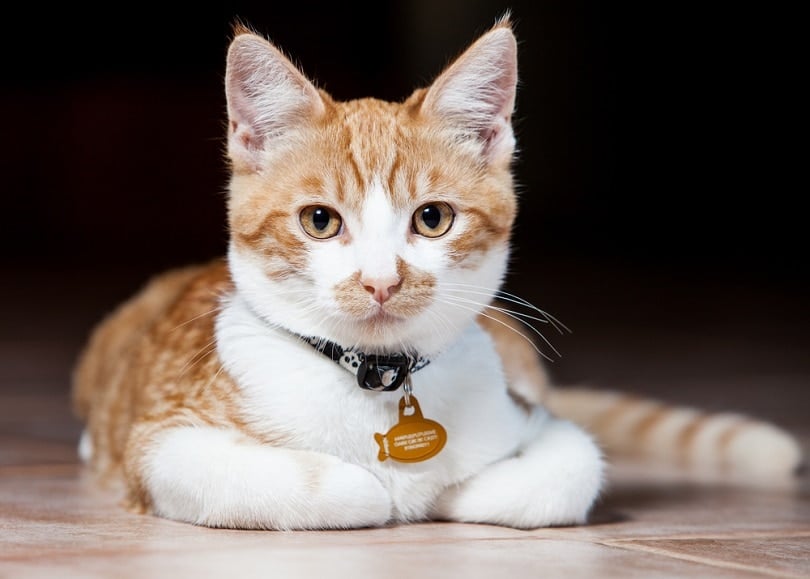
Breakaway Buckles
Breakaway buckles are designed to release when tension is applied to the collar. Each buckle has a different release weight. Some buckles release with five pounds of pressure or less, while other buckles require upwards of 10 pounds to open. A heavier latch is great for bigger cats but could be dangerous for smaller cats that aren’t heavy enough to open it.
Many cats will figure out how the buckle works and start removing the collars themselves, so you might have a hard time keeping these on your cat. Still, it’s an effective way to prevent strangulation.
Elastic
Elastic collars don’t release when your cat gets caught. Instead, they’re stretchy, so when your cat attempts to pull loose, the collar will stretch, and your cat should be able to remove their head.
These tend to stay on better than breakaway collars since they’re harder to remove. However, that can also mean they’re less likely to free your cat in some situations. We’ve also seen cats get their mouths tangled in elastic collars while attempting to remove them.
Appearances – Unique & Cool Cat Collars
At the end of the day, we all want our cats to be cute, so appearances are going to play a role in deciding what collar to purchase. You’re going to see your cat in that collar every day, so you have to like it.
To make them more attractive, collars come in various colors and designs. You can find solid colors of every hue if you prefer a plainer look. Alternatively, many collars have ribbons sewn on that feature designs of all types. Whatever your style, you’re sure to find a collar that fits your personality and your cat’s.
 Conclusion
Conclusion
Few things will ever be as close to our hearts as our pets. That’s why we spend the extra time reading reviews, searching for just the right collar to keep our cats safe and pretty.
Our favorite collar of all was the Hepper Hemp Breakaway Cat Collar. This hemp collar comes in many attractive colors and will fit a wide range of cats from 5 pounds all the way to big 25-pounders. The quick-release clip will break away under tension to keep your cat safe and the wildlife bell keeps the other critters safe. It was an easy pick for an overall best cat collar.
With plastic hardware that’s gentle against your cat’s skin except for a single metal ring for permanently attaching an ID tag, we think the Frisco Nylon Breakaway Cat Collar represents the best budget option. It’s good-lucking and well-made, with adjustability from 8-12 inches so it can fit just about any feline.
For the cat-obsessed pet parent who needs a constant connection with their cat, the Pettsie Heart Cotton Breakaway Cat Collar with Friendship Bracelet is our premium pick. The stylish friendship bracelet matches your cat’s collar so you can always show how proud you are of your furry friend.
Related Reads:
- What Are E-Collars for Cats? When Should I Use Them?
- Best Outdoor Cat Houses – Reviews & Top Picks
- Best Cat Cone Collars: Reviews & Top Picks
Featured Image Credit: stockelements, Shutterstock
Contents
- A Quick Comparison of Our Winners of 2024
- The 11 Best Cat Collars
- 1. Hepper Hemp Breakaway Cat Collar – Best Overall
- 2. Frisco Solid Nylon Breakaway Cat Collar – Budget Buy
- 3. Pettsie Heart Cat Collar
- 4. Necoichi Japanese Kimono Style Bow Tie Cat Collar
- 5. Pawtitas Glow In The Dark Cat Collar
- 6. Red Dingo Classic Cat Collar
- 7. CollarDirect Leather Cat Collar
- 8. Coastal Pet Products ElastaCat Pet Collar
- 9. Kittyrama Cat Collar
- 10. PUPTECK Soft Leather Cat Collar
- 11. Petmate Cat Pet Collar
- Buyer’s Guide: How to Choose the Best Cat Collars
- How to Fit Your Cat’s Collar
- Measuring for Your Cat’s Collar
- Fitting Your Cat’s Collar
- Choosing the Correct Cat Collar
- Material
- Safety Features
- Breakaway Buckles
- Elastic
- Appearances – Unique & Cool Cat Collars
- Conclusion


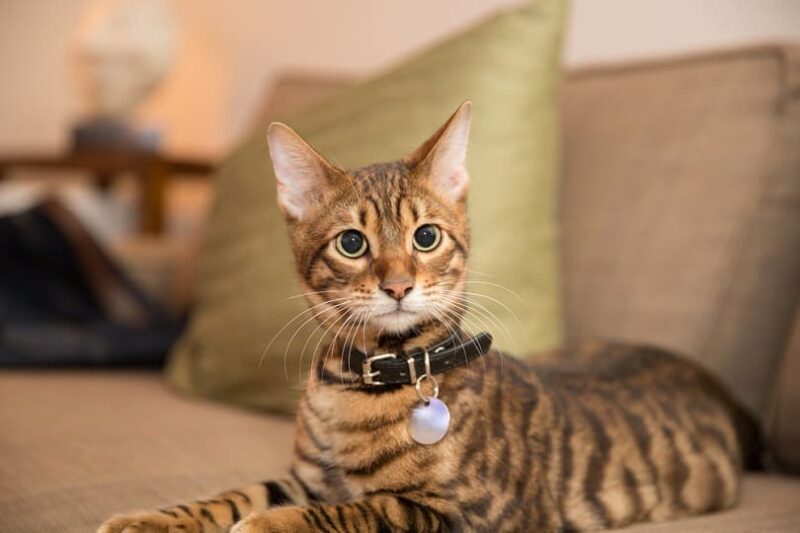




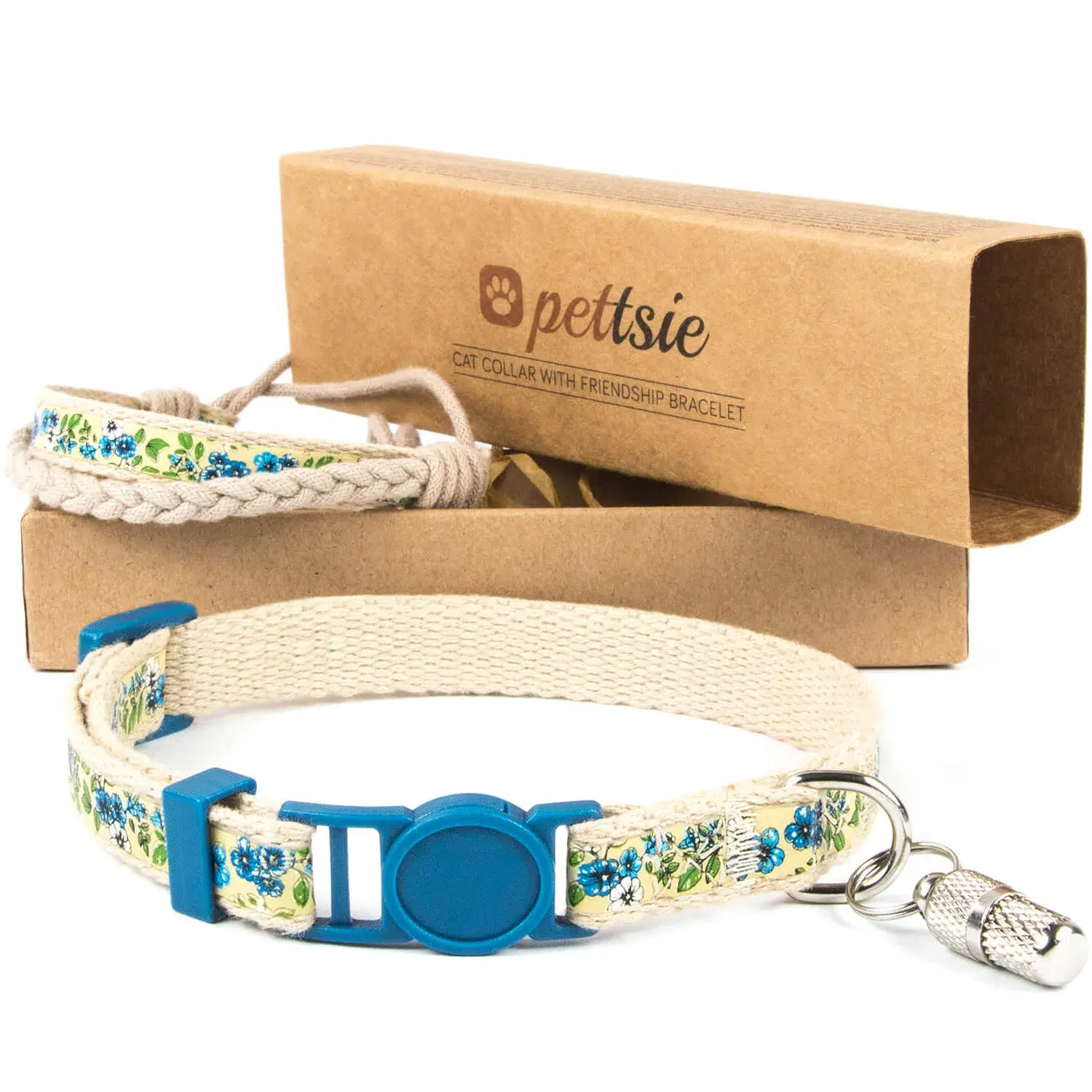

 Conclusion
Conclusion



